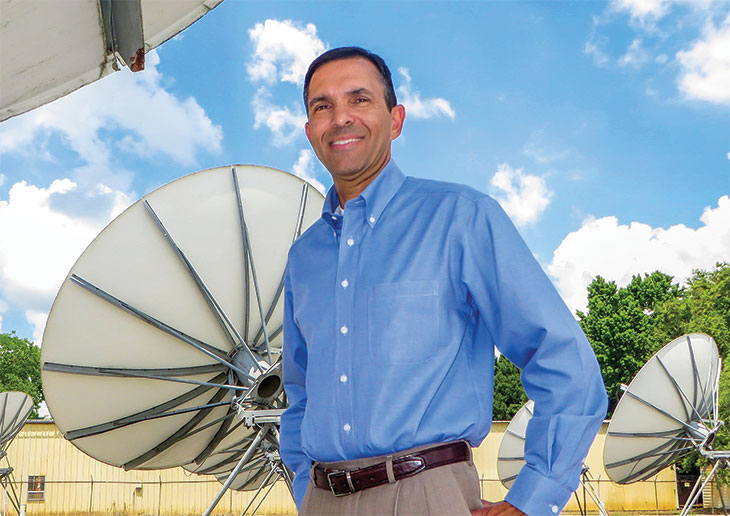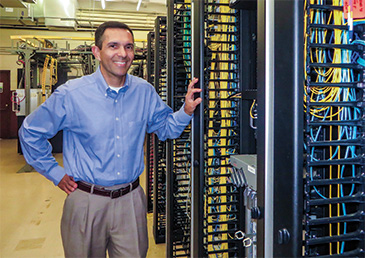
Photos by Nancy Jorgensen
EATEL uses satellite dishes to bring in the network signals it offers to TV customers. Pictured is the telecom’s chief financial officer, Peter Louviere.
Most Americans are familiar with telecommunications giants such as AT&T and Cox that provide phone, Internet and TV service. But if you live in southern Louisiana, you may be served by EATEL, a lesser known telecom that’s been keeping Louisianans connected since before many farm families owned telephones.
Based in Gonzales, La., population 11,000, EATEL was established in 1935 by Fred and Anona Banker, who operated a switchboard out of their home.
Like most small, independent telecoms, EATEL — known as Gonzales Telephone Exchange until 1950 — started out serving rural customers that large companies refused to serve because of the unlikely potential for profit in rural areas.
If this company had stuck with the legacy telephone business, it would be a fraction of the size it is today, and we wouldn’t be able to provide the high-tech services that our customers need.”
– Peter Louviere
Today, the business is still family-owned and -operated in Gonzales, and calls to EATEL are still answered by a live, local person. But EATEL is much more than your grandfather’s local phone company. By offering the latest in technology, from fiber networks to home automation services, this Farm Credit customer has continued to succeed in the highly competitive telecom industry.
EATEL Through the Years
1935 Banker family starts Gonzales Telephone Exchange at home using salvaged equipment.
1950 Gonzales Telephone Exchange changes its name to EATEL.
1980s EATEL offers wireless service.
1995 Company begins offering Internet service.
2002 EATEL starts competing with Bell South for residential customers in Louisiana.
2004 EATEL builds one of the nation’s first 100-percent fiber-to-the-home networks in Gonzales, and starts adding fiber in other locations. By 2005, it uses fiber to offer digital TV and high-speed Internet service.
2013 EATEL purchases a data center. A subsidiary, EATEL Business, now operates three high-quality data centers, where business customers store data in the cloud, use the facilities as co-locations, store back-ups for their servers or use managed services.
2013 The company launches smart home security and automation services.
“Our company has earned a reputation for pioneering the latest technology. That’s how we’ve become one of the top independent telecommunications companies in the region,” says EATEL Chief Financial Officer Peter Louviere.
“Legacy telephone companies that just offer landline phone service are dying on the vine,” he notes. “EATEL’s owners constantly seek out strategies to further develop the company.”
While the company’s name and technology have transitioned over the years, the business has remained in the Banker family. EATEL is now owned and operated by Fred and Anona’s grandchildren: brothers John Scanlan, chief executive officer, and Arthur “Smokey” Scanlan, chairman of the board, and their sister Beryl Smith. Three great-grandchildren also work for EATEL.
“If this company had stuck with the legacy telephone business, it would be a fraction of the size it is today, and we wouldn’t be able to provide the high-tech services that our customers need,” Louviere says.
Landlines Down, Mobile Up
Across the U.S., the number of households with traditional landlines, also called access lines, shrank from 93 percent in 2004 to 44 percent in 2017, according to the Centers for Disease Control and Prevention. During the same period, households with mobile phones increased from 5 percent to 53 percent.
Currently, EATEL serves several thousand landline customers, but by expanding to other locations and offering new products from TV to data, it has grown its customer numbers exponentially.
More subscribers joined EATEL over the years as Baton Rouge expanded southward toward Gonzales and EATEL’s customer base transitioned from rural to suburban. Acquisitions further enlarged the company’s footprint and offerings.
“CoBank and Farm Credit understand the telecommunications business. They understand the risk, and price their loans accordingly.”
– Peter Louviere
In 2012, EATEL purchased the small family-owned rural telecoms Lafourche Telephone Co. and Vision Communications, where Louviere was chief financial officer. Five years later, the company bought Clear Choice Communications near Baton Rouge.
Today, EATEL’s revenue comes from a mixture of Internet, video, voice and data center services. EATEL also offers security alarm and automation services that allow consumers to remotely control lighting, heating, cooling and other functions. In most locations, the company offers high-speed broadband services through its fiber network. Fiber is generally recognized as the fastest, most dependable way to deliver broadband, which refers to high-speed Internet access that is always available.

EATEL was the first company in Louisiana to provide TV, Internet and telephone services over an all-fiber network.
While the majority of EATEL’s customers are residential, Louviere expects even more growth opportunity from business customers. The company operates two Tier II data centers near Baton Rouge, which host large computer servers for businesses, and a higher rated Tier III center near Shreveport — the only one in Louisiana.
Along the way, EATEL has divested itself of business lines that no longer supported the company’s long-term strategy, for instance dropping its telephone directory business and selling its cellular business lines to large national carriers like Verizon, Sprint, AT&T and T-Mobile.
Farm Credit Finances Rural Telecoms
When you think of Farm Credit, you may think of loans for farmers and ranchers. But every day, high-tech telecommunication becomes more essential to agricultural producers and rural communities. That’s why the Farm Credit System supports measures to expand rural broadband.
If you depend on high-speed broadband, data storage and other services, you might be happy to know that Farm Credit does telecommunications lending.
CoBank, one of four wholesale funding banks in the Farm Credit System, is chartered to finance rural infrastructure businesses as part of its mission. It often teams up with Farm Credit Bank of Texas and other System banks and local lending cooperatives to finance these businesses.
At year-end 2017, loans for rural infrastructure, including telecom, electric, water, wastewater and transportation, accounted for 11 percent of the System’s $259 billion loan portfolio.
Farm Credit Bank of Texas and its affiliated lending cooperatives in Alabama, Louisiana, Mississippi, New Mexico and Texas had rural infrastructure loan commitments totaling approximately $2 billion, including $500 million in communications loans, as of June 30, 2017.
– Nancy Jorgensen
“The Scanlan family recognizes that stagnation is not the route to prosperity,” Louviere says. “They’ve always hired tech-savvy people. We often feature some of these employees in ads and promotions.”
According to Louviere, EATEL’s employees excel at customer service. The company operates five customer care centers, usually responds to trouble calls within a day, and supports its local communities. That, combined with a commitment to the latest technology, sets EATEL apart from the competition, he claims.
Farm Credit a Key Partner
There are some 850 independently owned telecoms across the United States, and many of them — including EATEL — are Farm Credit customers. In fact, EATEL has financed with the nationwide Farm Credit System since the 1990s. For the past several years, Farm Credit Bank of Texas and three of its affiliated local lending cooperatives have participated with CoBank, which is part of the System, in loans to EATEL.
“CoBank and Farm Credit understand the telecommunications business,” says Louviere, who has worked with the lender since his early days at Lafourche Telephone Co. “They understand the risk, and price their loans accordingly. Our transactions with CoBank have been fair, and we consider them business partners.”
From the lender’s perspective, EATEL is an attractive borrower.
“To be successful, a company must grow, which means diversifying beyond the traditional landline business,” says Ted Koerner, CoBank senior vice president of telecommunications lending. “The EATEL team has had a long history of diversifying. They participated in the early days of wireless when it was a growth sector. They’re currently deepening their fiber network to provide robust broadband offerings, and they’re participating in the high-growth data center sector.”
The telecom industry continues to evolve rapidly, and competition from other Internet, TV and voice providers remains stiff. Maintaining EATEL’s track record of success won’t be easy.
“However, with ongoing dynamic leadership from our owners, and with financial support from Farm Credit, we will continue to thrive,” Louviere concludes.